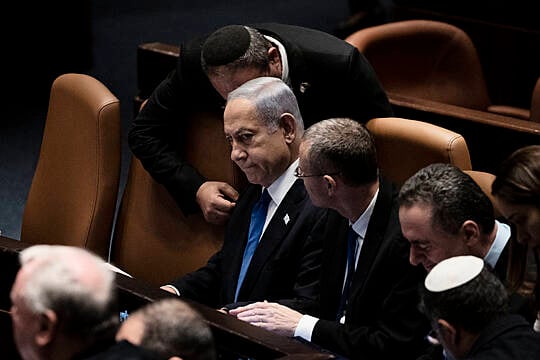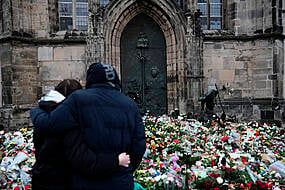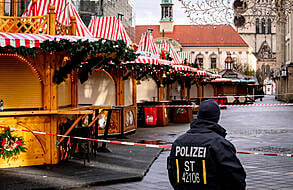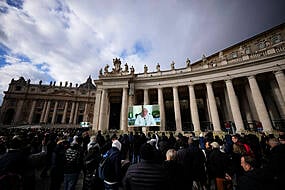Israeli politicians have approved a key part of prime minister Benjamin Netanyahu’s divisive plan to reshape the country’s justice system.
Monday’s vote came after a stormy session in which opposition politicians chanted “shame” and stormed out of the chamber.
The vote reflects the determination of Mr Netanyahu and his far-right allies to move ahead with the plan, despite massive, sustained protests for months and opposition from business leaders, military reservists and legal officials.
Politicians approved a measure preventing judges from striking down government decisions on the basis they are “unreasonable”.
Proponents say the current “reasonability” standard gives unelected judges excessive powers over decision-making by elected officials.

But critics of the government says it removes a key element of the court’s oversight powers and opens the way for corruption and improper appointments.
With the opposition out of the hall, the measure passed by a 64-0 margin.
After the vote, justice minister Yariv Levin, the architect of the plan, said parliament has taken the “first step in an important historic process” of overhauling the judiciary.
More mass protests are now expected.
Earlier, demonstrators, many of whom feel the very foundations of their country are being eroded by the government’s plan, blocked a road leading up to the parliament, and big shopping centre chains and some petrol stations shut their doors in protest.
Further ratcheting up the pressure on Mr Netanyahu, thousands of military reservists have declared their refusal to serve under a government taking steps that they see as setting the country on a path to dictatorship.
Those moves have prompted fears that the military’s preparedness could be compromised.

“These are dangerous cracks,” military chief Lieutenant General Herzi Halevi said on Sunday in a letter to soldiers meant to address the tensions: “If we will not be a strong and cohesive military, if the best do not serve in the IDF, we will no longer be able to exist as a country in the region.”
Ahead of Monday’s vote, opposition leader Yair Lapid declared: “We are headed for disaster.”
The vote came hours after Mr Netanyahu was released from hospital, where he had a pacemaker fitted.
His sudden hospital admission added another dizzying twist to an already dramatic series of events, which were watched closely in Washington.
The Biden administration has frequently spoken out against Mr Netanyahu’s government and its overhaul plan.
In a statement to the news site Axios late on Sunday, US President Joe Biden warned against pushing ahead with the legal changes sparking so much division.
“Given the range of threats and challenges confronting Israel right now, it doesn’t make sense for Israeli leaders to rush this — the focus should be on pulling people together and finding consensus,” he told the site.
Mr Biden has also been critical of the government’s steps to deepen Israel’s occupation of the West Bank.
The massive, sustained democracy protests have shunned mention of Israel’s 56-year occupation of lands the Palestinians seek for their hoped-for independent state, fearing the issue might alienate supporters.
But critics portray this rule over another people as a major stain on Israel’s claim to be a liberal democracy and accuse the protesters of harbouring a significant blind spot in their struggle.
The overhaul calls for sweeping changes aimed at curbing the powers of the judiciary, from limiting the Supreme Court’s ability to challenge parliamentary decisions to changing the way judges are selected.
Mr Netanyahu and his allies say the changes are needed to curb the powers of unelected judges.
Protesters, who come from a wide swath of Israeli society, see the overhaul in general as a power grab fuelled by personal and political grievances of Mr Netanyahu — who is on trial for corruption charges — and his partners.

As politicians debated, tens of thousands of people gathered for mass rallies for and against the plan.
Protesters banging on drums and blowing horns blocked a road leading to Israel’s parliament and police used water cannons to push them back.
The protest movement said one of its leaders was arrested.
“The state of Israel stands before destruction and ruin that is being brought upon it by a gang of extremists and kooks. We must go up to Jerusalem today!” one branch of the protest movement called out to demonstrators on social media.
Mr Netanyahu’s supporters, meanwhile, thronged central Tel Aviv — normally the setting for anti-government protests.
Despite the attempts to project business as usual, Mr Netanyahu’s schedule was disrupted by his hospital admission, with a Cabinet meeting and trips postponed.
His doctors said on Sunday the procedure had gone smoothly and the prime minister said in a short video statement from the hospital that he felt fine.
Mr Netanyahu paused the overhaul in March after intense pressure by protesters and labour strikes that halted outgoing flights and shut down parts of the economy.
After talks to find a compromise failed last month, he said his government was pressing on with the overhaul.







